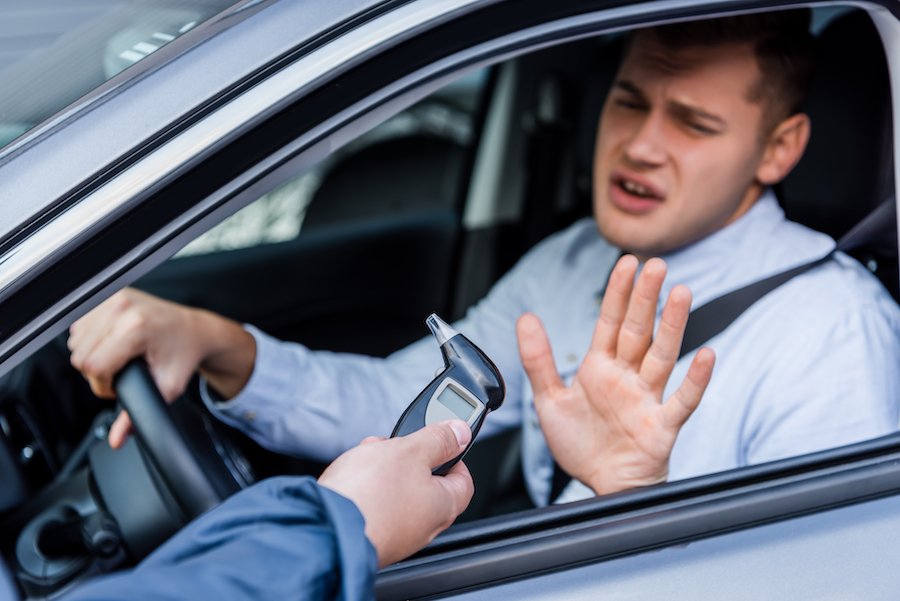ARS 28-1383(a)(1) is the Arizona statute that says people are guilty of an aggravated DUI if they drive under the influence after a driver’s license suspension, license revocation, or license cancelation. A violation of this code section is a Class 4 felony. The crime is punishable by a minimum of four months in state prison and a fine of $4,000.
Examples
- drunk driving while on a suspended license.
- driving a motor vehicle with a .08% blood alcohol concentration (BAC) after having a license revoked for a prior Arizona DUI.
- driving under the influence after one’s driving privileges were canceled for failing to appear in court.
Defenses
DUI defense attorneys draw upon several legal strategies to help clients contest aggravated DUI charges. A few common ones include DUI lawyers showing that:
- the defendant did not have a revoked license, restricted license, or suspended license,
- the accused was not under the influence, and/or
- police violated one of the defendant’s constitutional rights.
Penalties
A violation of this Arizona law is a Class 4 felony (as opposed to a misdemeanor offense).
Penalties can rise to the level of:
- a mandatory minimum prison sentence of four months,
- a fine of at least $4,000, and
- a minimum 1-year driver’s license suspension.
In this article, our Arizona DUI defense attorneys will discuss what the law is under this statute, defenses available if charged, the penalties for a conviction, and related crimes.

ARS 28-1383A1 is the Arizona statute that says people are guilty of an aggravated DUI if they drive under the influence after a driver’s license suspension, license revocation, or license cancelation.
1. How does Arizona law define “impaired driving with a suspended, revoked, or invalid license”?
A prosecutor must prove the following elements to successfully convict a driver under ARS 28-1383A1:
- the defendant drove or was in actual physical control of a motor vehicle while under the influence (of alcohol and/or drugs), or
- the defendant drove or was in actual physical control of a vehicle with a blood alcohol content above the legal limit of .08%, and
- the accused was driving on a suspended, revoked, or invalid license.1
Note that the Arizona Department of Transportation Motor Vehicle Division (MVD) can suspend, revoke, or cancel a person’s driver’s license/driving privileges for a variety of reasons. Some of these include:
- violations of one of Arizona’s DUI laws,
- criminal convictions (including DUI convictions),
- failing to appear in court,
- failing to pay child support, and
- the accumulation of points on a motorist’s driving record.
2. Are there defenses to ARS 28-1383A1?
People accused of a crime in these DUI cases can challenge the accusation with a legal defense. Three common defenses include defendants showing that:
- they did not have a suspended or revoked license.
- they were not under the influence.
- police violated one of their constitutional rights.
2.1. No suspended or revoked license
People are only guilty under this statute if they drive drunk on a suspended, canceled, or revoked license. A defense, then, is for accused people to show that they did not have an invalid license at the time of their DUI arrest.
2.2. Not under the influence
Recall that in these DUI cases an accused is only guilty if he/she drove on a suspended license while “under the influence.” If the police did not conduct a breathalyzer test or blood test, a defendant can challenge a charge by showing that he/she was not intoxicated or under the influence.
2.3. Violation of a constitutional right
Defendants can always contest an aggravated DUI charge by showing that law enforcement violated one of their constitutional rights. For example, maybe the authorities:
- conducted an unlawful search or seizure,
- stopped or arrested the defendant without probable cause,
- coerced a confession, or
- failed to read the defendant his/her Miranda rights.
In these situations, a defendant can attempt to use the violation to try and get a DUI charge reduced or even dropped altogether.

A violation of this statute can result in a fine and/or jail time.
3. What are the penalties for this DUI offense?
Driving under the influence while on an invalid license is a form of felony DUI (as opposed to a misdemeanor DUI). More specifically, a conviction for the offense is a Class 4 felony.
The crime is punishable by at least four months of prison time (as opposed to jail time).
A judge also has the discretion to impose the following DUI penalties:
- at least $4,000 in fines,
- a minimum 1-year driver’s license suspension,
- alcohol or other drug screening, education, or treatment,
- minimum 24 months of driving with an ignition interlock device (IID),
- a traffic survival school course, and
- forfeiture of the vehicle.2
4. Are there related offenses?
There are three crimes related to DUI on an invalid license. These are:
- impaired driving with a passenger under the age of 15 – ARS 28-1383A3,
- DUI – ARS 28-1381A1, and
- underage 21 DUI – ARS 4-244(34).
4.1. Impaired driving with a passenger under the age of 15 – ARS 28-1383A3
Per ARS 28-1383A3, impaired driving with a passenger under the age of 15 is the crime where people drive drunk while having a passenger in the vehicle who is under 15 years of age.
As with a DUI offense under ARS 28-1383A1, a violation of this law is a type of aggravated DUI that can result in a felony conviction.
4.2. DUI – ARS 28-1381A1
Under ARS 28-1381A1, DUI is the offense where someone drives or is in actual physical control of a motor vehicle while under the influence of:
- alcohol,
- drugs,
- a vapor releasing substance containing a toxic substance, or
- any combination of liquor, drugs, or vapor.
Unlike with aggravated DUI, a first offense under this statute is a misdemeanor DUI. The criminal law that says that people guilty of DUI can face:
- jail time,
- a 90-day driver’s license revocation,
- an IID for 1 year,
- drug and alcohol screening, education, or treatment,
- traffic survival school course, and/or
- possibly community service.
4.3. Underage 21 DUI – ARS 4-244(34)
Per ARS 4-244(34), underage 21 DUI is the crime where:
- someone under 21 years of age drives, or is in physical control of a motor vehicle, and
- they do so while there is any alcohol in their body.
Unlike with an aggravated DUI charge, people are guilty of this crime if they have any detectable level of alcohol in their system. There is no .08% BAC or “under the influence” threshold.
For additional help…

Call us for help!
For additional guidance or to discuss your case with a criminal defense lawyer, we invite you to contact our law firm/law office at the Shouse Law Group. Our legal team provides both free initial consultations and legal advice you can trust.
Our DUI attorneys also represent clients throughout the State of Arizona, including those in Mesa, Scottsdale, and Phoenix.
Legal References:
- Arizona Revised Statutes 28-1383A1. See also State v. Kozlowski, 143 Ariz. 137 (1984).
- See ARS 28-1383.
